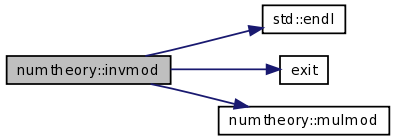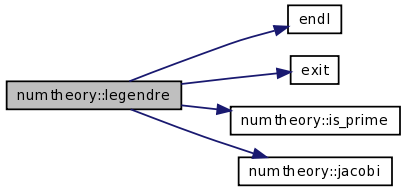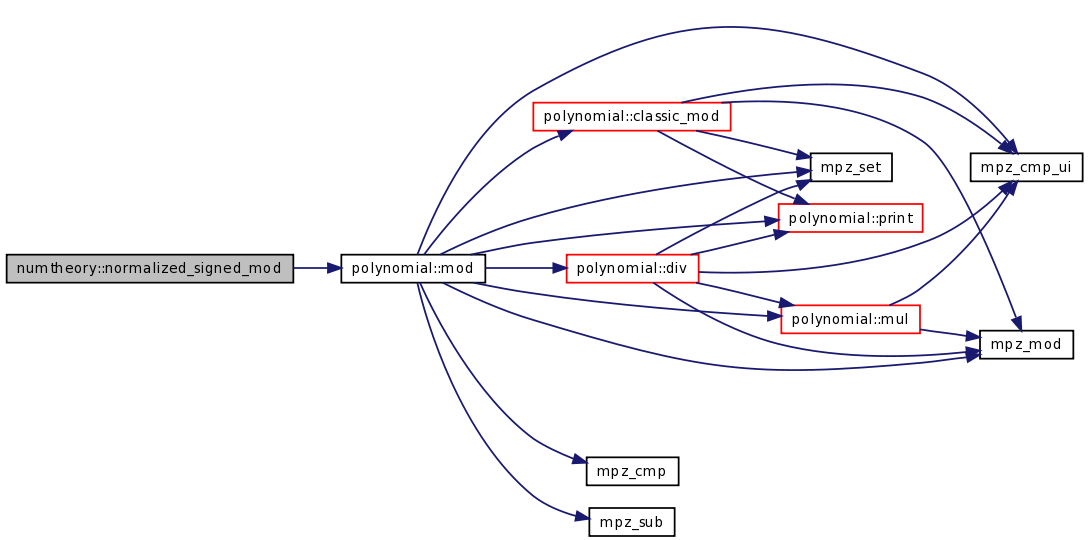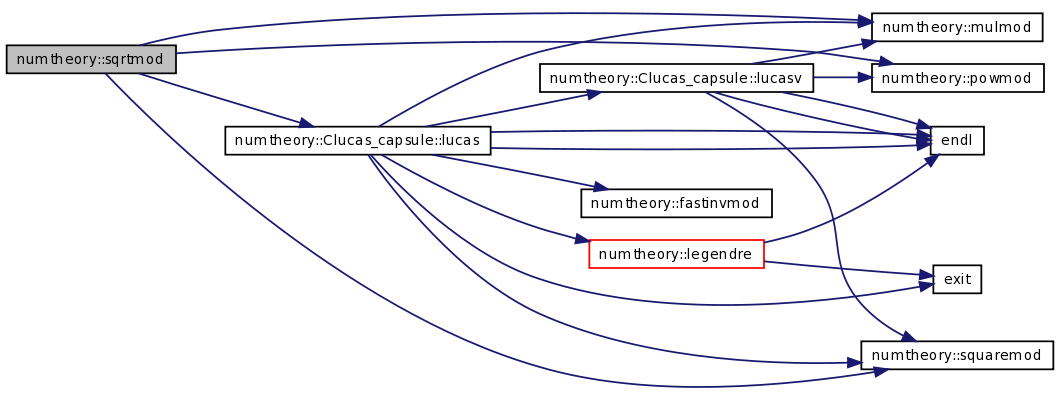| unsigned int numtheory::fastinvmod_23bit | ( | const unsigned int | x, | |
| const unsigned int | m | |||
| ) | [inline] |
Definition at line 691 of file modulo.H.
References fast_invmod().

Classes | |
| class | Clucas_capsule |
Functions | |
| bool | strong_probab_prime (const unsigned int p, const unsigned int base) |
| bool | probab_prime (const unsigned int p) |
| bool | is_prime (register const int p) |
| signed int | jacobi (int a, unsigned int b) |
| signed int | legendre (signed int a, const unsigned int p) |
| unsigned int | invmod (const unsigned int x, const unsigned int m) |
| unsigned int | bininvmod (register unsigned int x, register const unsigned int m) |
| static const char shifts[64] | __attribute__ ((aligned(64))) |
| unsigned int | montgominvmod (register unsigned int x, unsigned int m) |
| unsigned int | normalized_signed_mod (const signed int x, const int m) |
| unsigned int | reciprocal (register const unsigned int m) |
| unsigned int | normalized_signed_mod (register const signed int x, register const int m, const int &recip_m) |
| unsigned int | mulmod (const unsigned int a, const unsigned int b, const unsigned int m) |
| unsigned int | squaremod (const unsigned int a, const unsigned int m) |
| unsigned int | normalized_signed_mulmod (signed int x1, signed int x2, const int m) |
| unsigned int | powmod (register unsigned int a, register unsigned int pow, const unsigned int m) |
| unsigned int | gcd (register unsigned int a, register unsigned int b) |
| unsigned short int | gcd (register unsigned short int a, register unsigned short int b) |
| unsigned int | oddgcd (register unsigned int a, register unsigned int b) |
| bool | coprime (register unsigned int a, register unsigned int b) |
| unsigned int | fastinvmod (const unsigned int x, const unsigned int m) |
| unsigned int | fastinvmod_23bit (const unsigned int x, const unsigned int m) |
| unsigned int | sqrtmod (const unsigned int Radikant, const unsigned int Primzahl) |
| static const char shifts [64] numtheory::__attribute__ | ( | (aligned(64)) | ) | [static] |
| unsigned int numtheory::bininvmod | ( | register unsigned int | x, | |
| register const unsigned int | m | |||
| ) |
| x | an odd unsigned integer value | |
| m | an unsigned integer value |
x mod m y be the modular inverse of x mod m, then x * y = 1 (mod m)x and m are coprime, 0 < x < m and m is odd.x =x'*2^k and 0 < x' < m is also allowed| x | an odd unsigned integer value | |
| m | an unsigned integer value |
x mod m y be the modular inverse of x mod m, then x * y = 1 (mod m)x and m are coprime, 0 < x < m and m is odd. Definition at line 357 of file modulo.cc.
Referenced by main().
| bool numtheory::coprime | ( | register unsigned int | a, | |
| register unsigned int | b | |||
| ) | [inline] |
| a | an unsigned integer | |
| b | an unsigned integer |
a and b are coprime (that is gcd(a,b)==1) Definition at line 584 of file modulo.H.
Referenced by CmpqsPolynom::compute_next_polynomial(), and main().
| unsigned int numtheory::fastinvmod | ( | const unsigned int | x, | |
| const unsigned int | m | |||
| ) | [inline] |
| x | an odd unsigned integer value | |
| m | an unsigned integer value |
x mod m y be the modular inverse of x mod m, then x * y = 1 (mod m)x and m are coprime, 0 < x < m and m is odd.Definition at line 660 of file modulo.H.
Referenced by DynamicFactorArrays::compute_Deltas_for_DynamicFactors(), and numtheory::Clucas_capsule::lucas().
| unsigned int numtheory::fastinvmod_23bit | ( | const unsigned int | x, | |
| const unsigned int | m | |||
| ) | [inline] |
Definition at line 691 of file modulo.H.
References fast_invmod().

| unsigned short int numtheory::gcd | ( | register unsigned short int | a, | |
| register unsigned short int | b | |||
| ) | [inline] |
Definition at line 516 of file modulo.H.
Referenced by elliptic_curves::go(), and polphi_template().
| unsigned int numtheory::gcd | ( | register unsigned int | a, | |
| register unsigned int | b | |||
| ) | [inline] |
a and b Definition at line 509 of file modulo.H.
Referenced by elliptic_curves::go(), and polphi_template().
| unsigned int numtheory::invmod | ( | const unsigned int | x, | |
| const unsigned int | m | |||
| ) |
| x | an unsigned integer value | |
| m | an unsigned integer value |
x mod m y be the modular inverse of x mod m, then x * y = 1 (mod m)x and m are coprime. Definition at line 184 of file modulo.cc.
References std::cerr, std::endl(), exit(), and mulmod().
Referenced by StaticFactorbase::compute_StaticFactorbase(), main(), and test01().

| bool numtheory::is_prime | ( | register const int | p | ) |
| p | unsigned integer to check for primality |
p is a prime numberDefinition at line 84 of file modulo.cc.
Referenced by StaticFactorbase::compute_StaticFactorbase(), determine_best_MPQS_Multiplier(), polynomial::CDFT_base::get_valid_primes_for(), elliptic_curves::go(), legendre(), and polphi_template().
| signed int numtheory::jacobi | ( | int | a, | |
| unsigned int | b | |||
| ) |
| a | an integer value | |
| b | an odd unsigned integer value |
b) Definition at line 106 of file modulo.cc.
Referenced by legendre().
| signed int numtheory::legendre | ( | signed int | a, | |
| const unsigned int | p | |||
| ) |
| a | an integer value | |
| p | an odd prime number (as unsigned integer) |
a is a quadratic residue modulo p a is not a quadratic residue modulo p a and p are not coprime p is an odd prime number. You cannot rely on on any specific behaviour on this function, if this condition is not met!Definition at line 151 of file modulo.cc.
References cerr, endl(), exit(), is_prime(), and jacobi().
Referenced by numtheory::Clucas_capsule::lucas().

| unsigned int numtheory::montgominvmod | ( | register unsigned int | x, | |
| unsigned int | m | |||
| ) |
| x | an unsigned integer value | |
| m | an unsigned integer value |
x mod m y be the modular inverse of x mod m, then x * y = 1 (mod m)x and m are coprime, 0 < x < m and m is odd.| x | an odd unsigned integer value | |
| m | an unsigned integer value |
x mod m y be the modular inverse of x mod m, then x * y = 1 (mod m)x and m are coprime, 0 < x < m and m is odd. Definition at line 520 of file modulo.cc.
Referenced by main().
| unsigned int numtheory::mulmod | ( | const unsigned int | a, | |
| const unsigned int | b, | |||
| const unsigned int | m | |||
| ) | [inline] |
| a | an unsigned integer value | |
| b | an unsigned integer value | |
| m | an unsigned integer value |
a * b mod m a < m and b < m Definition at line 249 of file modulo.H.
Referenced by DynamicFactorArrays::compute_Deltas_for_DynamicFactors(), StaticFactorbase::compute_StaticFactorbase(), invmod(), numtheory::Clucas_capsule::lucas(), numtheory::Clucas_capsule::lucasv(), main(), and sqrtmod().
| unsigned int numtheory::normalized_signed_mod | ( | register const signed int | x, | |
| register const int | m, | |||
| const int & | recip_m | |||
| ) | [inline] |
| x | a signed integer value | |
| m | an unsigned 32bit integer value | |
| recip_m | the reciprocal of m (2^32/m +1) |
x mod m x % m. It normalizes the result to a nonnegative number. (On most architectures x % m is negative, if x is negative.) Since a precomputed reciprocal is used, this implementation trades one expensive integer division for two cheap integer multiplications. Definition at line 131 of file modulo.H.
Referenced by DynamicFactorArrays::compute_Deltas_for_DynamicFactors(), and main().
| unsigned int numtheory::normalized_signed_mod | ( | const signed int | x, | |
| const int | m | |||
| ) | [inline] |
| x | a signed integer value | |
| m | an unsigned integer value |
x mod m x % m. It normalizes the result to a nonnegative number. (On most architectures x % m is negative, if x is negative.) Definition at line 42 of file modulo.H.
References polynomial::mod().

| unsigned int numtheory::normalized_signed_mulmod | ( | signed int | x1, | |
| signed int | x2, | |||
| const int | m | |||
| ) | [inline] |
| unsigned int numtheory::oddgcd | ( | register unsigned int | a, | |
| register unsigned int | b | |||
| ) | [inline] |
| a | must be an odd unsigned integer | |
| b | must be an odd unsigned integer |
a and b Definition at line 533 of file modulo.H.
Referenced by main().
| unsigned int numtheory::powmod | ( | register unsigned int | a, | |
| register unsigned int | pow, | |||
| const unsigned int | m | |||
| ) | [inline] |
modular exponentiation
| a | base, an unsigned integer value | |
| pow | exponent, an unsigned integer value | |
| m | unsigned integer value |
a ^ pow mod m Definition at line 421 of file modulo.H.
Referenced by numtheory::Clucas_capsule::lucasv(), sqrtmod(), and strong_probab_prime().
| bool numtheory::probab_prime | ( | const unsigned int | p | ) |
| p | unsigned integer to check for primality |
p is probably prime to the bases 2, 7 and 61.p is prime, iff 61 < p < 4.759.123.141 (and no integer overflow occurs), as someone has checked these conditions beforehand. Definition at line 63 of file modulo.cc.
References strong_probab_prime().
Referenced by CmpqsFactor::DLP_get(), CmpqsFactor::DLP_get_using_pollard_rho(), test01(), and elliptic_curves::XZ_multiply().

| unsigned int numtheory::reciprocal | ( | register const unsigned int | m | ) | [inline] |
| m | an unsigned 32bit integer value |
m (=2^32/m +1) Definition at line 98 of file modulo.H.
Referenced by StaticFactorbase::compute_StaticFactorbase().
| unsigned int numtheory::sqrtmod | ( | const unsigned int | Radikant, | |
| const unsigned int | Primenumber | |||
| ) |
| Radikant | an unsigned integer value | |
| Primzahl | a prime unsigned integer value |
Radikant mod Primzahl, that is an unsigned integer value r, such that r * r mod Primzahl = Radikant Primzahl isn't checkedPrimzahl is composite| Radikant | an unsigned integer value | |
| Primenumber | a prime unsigned integer value |
Radikant mod Primenumber, that is an unsigned integer value r, such that r * r mod Primenumber = Radikant Primenumber isn't checkedPrimenumber is compositeDefinition at line 133 of file sqrt_modulo.cc.
References numtheory::Clucas_capsule::lucas(), mulmod(), powmod(), and squaremod().
Referenced by SQRT_kN_mod_PrimeNumber().

| unsigned int numtheory::squaremod | ( | const unsigned int | a, | |
| const unsigned int | m | |||
| ) | [inline] |
| a | an unsigned integer value with a < m | |
| m | an unsigned integer value |
a * a mod m a < m Definition at line 283 of file modulo.H.
Referenced by DynamicFactorArrays::compute_Deltas_for_DynamicFactors(), StaticFactorbase::compute_StaticFactorbase(), CmpqsPolynom::get_A2_mod(), numtheory::Clucas_capsule::lucas(), numtheory::Clucas_capsule::lucasv(), sqrtmod(), and strong_probab_prime().
| bool numtheory::strong_probab_prime | ( | const unsigned int | p, | |
| const unsigned int | base | |||
| ) |
| p | unsigned integer to test for primality | |
| base | base for the strong probable prime test |
p is a strong probable prime regarding to base . Definition at line 39 of file modulo.cc.
References powmod(), and squaremod().
Referenced by probab_prime().

 1.5.4
1.5.4